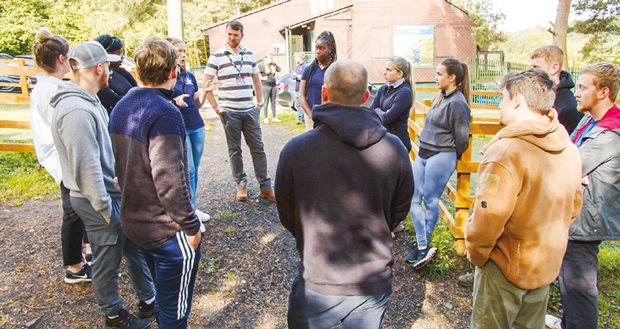Sarah Hale, Social Value Manager, Amey, on putting essential skills at the heart of young people’s training programmes
As one of the UK’s leading infrastructure services and engineering companies, we provide industry-leading employment opportunities, training and apprenticeships, and recognise the role we can play in opening up such opportunities in wider industry.
We believe that providing meaningful work and investing in people is fundamental to both social and economic stability and recognise that while talent is spread equally across the UK, opportunity is not. Business has a key role in addressing inequalities in education and skills to ensure everyone, no matter their background, has a chance to ‘get-in’ and ‘get-on’.
A key enabler for this is the focus on essential skills, the highly transferable skills needed by almost everyone to do almost any job – such as teamwork, speaking and listening, and problem solving. The skills sit between basic (literacy, numeracy and digital) and technical (operationally specific). These skills are particularly important for those in their early careers.
Higher levels of essential skills pay a dividend as a wage premium of around 15 per cent or £3,400 per year for full-time workers, particularly when combined with the ability to transfer and apply those skills. This supports a robust economic argument for investing in these skills. It is crucial that employers give young people the opportunity to develop essential skills within their employment, to help level the playing field.
Earlier this year, to help tackle this inequality, Amey brought together experts from Investors in People, The Duke of Edinburgh’s Award (DofE), Skills Builder Partnership and Business in the Community. The event was co-located with a meeting of 28 Amey employees completing their DofE Gold Award to enable Amey’s young people to join the debate and inspire conversation on what more can be done.
The full report is available to download at: www.amey.co.uk/bolder-steps-together/our-social-value-stories/putting-essential-skills-at-the-heart-of-young-people-programmes/ but below are some partner observations from the event and some advice to employers.
CHALLENGES FOR YOUNG PEOPLE
Organisations believe young people are missing the skills of emotional intelligence, risk taking, and being creative on entering the workplace. In turn, many young people believe they are lacking confidence; personal skills and being able to interact with people; communication; teamwork; project management; and basic ‘life skills’ such as financial awareness, tax and pensions, on entering the workplace.
Government priorities continue to remain on core subjects (English, science and maths), but while Arts based subjects tend to be better at enhancing essential skills, they are often the first to be dropped. Meanwhile, school students have mixed access to, and visibility and understanding of, possible career options but during school and university, the majority really don’t understand the world of work.
There is also a lack of visible role models for school students – and they often don’t represent the backgrounds and diversity of the students themselves. The preference is for these to be ‘local’ and mix of ages, helping young people to identify and connect with opportunities and career paths.
There is an expectation from young people that, when they enter the world of work, they will physically see people. With the increase in hybrid working, there needs to be a concerted effort for face-to-face interactions and opportunities to network and develop relationships
Not all organisations are using their Apprenticeship Levy, or they use it for senior management roles, which was not the intended purpose.
WHAT BUSINESSES CAN DO TO HELP
Provide greater visibility and understanding of all the roles and requirements across their sectors, for infrastructure management organisations, this might be roles in design, construction, and maintenance. Employers should offer visibility on what a working day or week looks like, which will help young people decide on careers and qualifications. The more businesses can share and explain these ‘routes in’, the more likely they will be to encourage young people into their sectors.
Employers should be much more proactive in recruitment – tapping into wider groups to access diverse skills and experience – and being more visible in communities. Young people often need support and role models to encourage them to apply for opportunities.
The Skills Builder Framework should be used across education so that it provides a familiar language for young people when embedded into job descriptions – thus supporting accessibility. This language could also be used within interview questions or tasks, or by assessors to evaluate candidates’ abilities.
Alongside this, consider providing advice, tips or practice for online interviews but also support and encourage face-to-face interactions and opportunities for young people to network and develop interpersonal relationships. This is particularly important with the increase of hybrid working.
Employers can also help to create a positive image of young people by sharing their successes and the value they bring.
Within the built environment it is important to engage with Tier 1 suppliers, encouraging the principles of essential skills throughout the supply chain by recruiting for potential and training for technical skills.
Finally, the FM sector needs to advocate for change. Incentivise our networks (such as supply chains) to do outreach activities and excite people about their businesses.
The session was incredibly helpful to see what we’re already doing well and what we could add to our young people outreach and programmes. Amey has committed to reporting regularly on these issues raised to stakeholders and the wider industry, as well as continuing to champion robust conversation and action.
For more information visit: https://bit.ly/3B3jwnD





